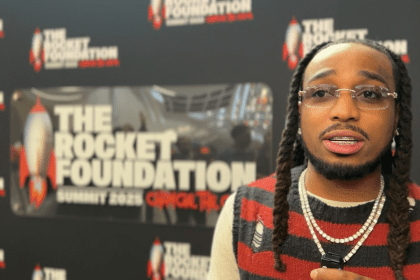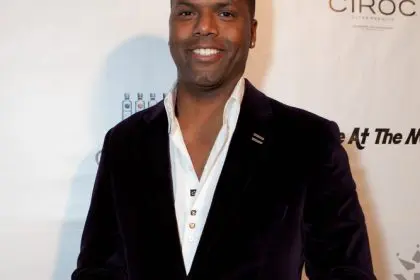In the heart of Atlanta, a city pulsing with political energy and historical significance, Dontaye Carter emerges as a multifaceted leader bridging grassroots activism and community organizing. With a portfolio that includes founding Carter Media Group, chairing the North Fulton Democratic Party, and serving as First Vice President of the NAACP Atlanta Chapter, Carter represents a new generation of Black leadership committed to transformative change.
During an intimate interview with rolling out, Carter opened up about his vision for Black community empowerment, the critical importance of family and an upcoming pivotal community meeting that aims to chart a collective path forward in challenging political times.
A Father’s Perspective: Rewriting Narratives
Carter’s approach to leadership is deeply personal, rooted in his relationship with his six-year-old daughter Kylie. Born two years before the COVID-19 pandemic, Kylie has been a constant companion during lockdown, offering Carter a unique lens into intergenerational dialogue and political awareness. “We have these awesome conversations,” Carter says, recounting a recent interaction where Kylie, already politically astute, questioned her classmates’ parents’ support of President-elect Trump. “She’s beyond her years,” he adds, emphasizing a broader mission to redefine narratives surrounding Black fatherhood and masculinity.
This commitment extends beyond his immediate family. Carter is vocal about challenging media and political discourse that seeks to fragment Black communities, particularly the tendency to dissect voting patterns along gender lines. “No other community gets separated like this,” he asserts. “You’ll never hear discussions about how white men vote compared to white women.”
The Post-Election Landscape: Confronting Hard Truths
The recent election left Carter and his community grappling with significant challenges, particularly around reproductive rights and healthcare. His wife’s emotional response on election night—mourning the potential impact on Black maternal mortality rates—underscores the deeply personal stakes of political outcomes.
“Black women’s healthcare rates compare to a third-world country,” Carter states. “We have to be honest about the time we’re in.” His critique extends to broader societal conversations about women’s health, challenging narratives that stigmatize reproductive choices.
Family Meeting: Charting the Path Forward
On Tuesday, November 19th, Carter is part of a critical community conversation at Revolt Studios, collaborating with Hip Politics and the NAACP Atlanta Chapter. The event isn’t just a meeting—it’s a “family conversation” designed to center Black voices in creating their own agenda. “Nobody’s going to save us,” Carter emphasizes. “We’ve got to grab this by the horns.” The meeting aims to create space for raw, unfiltered dialogue, recognizing that progress often emerges from difficult conversations.
Ancestry as Inspiration: Breaking Generational Chains
A transformative moment for Carter came during a visit to the National Archives with his daughter, where he traced his ancestry and discovered a deeply personal connection to the Civil Rights Movement. Learning that one of his ancestors worked on a plantation near the Edmund Pettus Bridge—the site of pivotal voting rights struggles—reframed his understanding of contemporary activism.
“We don’t know what chains we’re breaking with the decisions we make today,” he reflects. The meeting isn’t just about current challenges but about creating opportunities for future generations.
A Call for Unified Action
Despite the challenging political landscape, Carter remains optimistic. He emphasizes the importance of collaboration, rejecting any notion of isolationism. “We need everybody,” he insists. “There are people within our community who don’t think we need others. I’m here to tell you that we do.”
To those feeling disheartened and considering disengagement, Carter offers a powerful message: “Disengaging from the system doesn’t mean the system disengages from you. Participation isn’t optional—it’s essential.”
The Broader Vision: Beyond Physical Freedom
The upcoming meeting represents more than a political strategy session. It’s about comprehensive liberation—economic freedom, decision-making autonomy and creating systemic change. “We’re talking about the freedom to make decisions about our lives,” Carter explains. “Gone are the days where others can dictate our choices.”
An Invitation to Community
The November 19th meeting at Revolt Studios isn’t just an event—it’s a movement, a family reunion of sorts, where criticism is welcome and collective vision is the goal. “Everybody and their mama is going to be there,” he says with a knowing smile. And in Atlanta, that’s not just a saying—it’s a promise of collective power.










